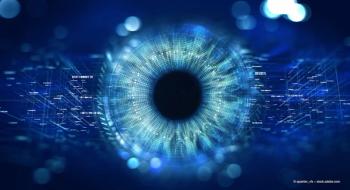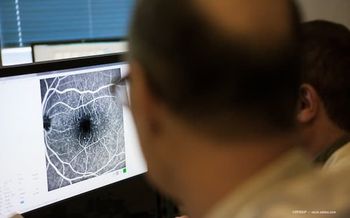
ICYMI: Study finds Americans over the age of 40 lack sight-saving knowledge of AMD
Retina specialists help educate the public to take steps to protect their vision during AMD Awareness Month.
A new survey of Americans 40 and older reveals a concerning lack of knowledge about the leading cause of blindness and vision loss among older adults, age-related macular degeneration (AMD).
Despite the fact that 89% of those surveyed indicated they would be devastated to lose their vision, the new study by the American Society of Retina Specialists (ASRS) showed many were unaware of the importance of dilated eye exams, the warning signs of AMD and the treatment advances made possible by retina specialists that can save and preserve vision when AMD is caught early.
February is AMD Awareness Month, and retina specialists find themselves on the front lines in the fight against the disease, educating patients to learn more about AMD and share key facts with friends and family to help save sight.
Approximately 11 million people in the United States have some form of AMD, a number that is expected to double by 2050, according to the ASRS news release. There are two major types of AMD, wet and dry. Most patients have early or intermediate dry AMD which can remain stable for a lifetime or can slowly degrade vision. Around ten percent of patients with intermediate AMD will develop wet AMD, an advanced form of AMD in which abnormal, leaking blood vessels develop beneath the macula and can cause rapid and severe vision loss in one or both eyes.
According to the news release, in the early stages, AMD has no symptoms, making early diagnosis through regular dilated eye exams key to preserving vision. Yet, nearly 20% of those surveyed actively avoid having their eyes dilated during eye exams. More than 1 in 3 Americans 40 and over (35%) did not know that the purpose of eye dilations at an eye exam is to look for changes in the back of the eye or retina that could lead to blindness or vision loss.
“Dilated eye exams allow a close and comprehensive look at the back of the eye, or retina, to identify signs of a retinal condition like wet AMD in the earliest, most treatable stages,” said ASRS President Judy E. Kim, MD, FASRS. “This new survey confirmed what retina specialists often hear from patients, that eye dilation can be uncomfortable because dilated eyes may be sensitive to light, and it may be challenging to read, drive or use a computer for a few hours until the dilation wears off. However, a few hours of mild discomfort and inconvenience can protect against vision loss and blindness and we strongly urge the public not to skip eye dilation when asked to safeguard their sight.”
The online survey, conducted by Atomik Research Insights & Analytics on behalf of ASRS in January 2023 among 1,008 U.S. adults 40 and older, revealed additional gaps in knowledge related to AMD symptoms, risk factors, and treatment.
Recognizing the symptoms of AMD and seeing a retina specialist right away are key to avoiding vision loss. But of those surveyed, 78% did not know straight lines appearing wavy or distorted was a symptom of AMD. And only half (51%) of Americans 40 and older are aware that a gradual or sudden loss of central vision or a dark, blurry area in the center of vision is an AMD symptom. Another AMD symptom the public should watch for is a decrease in the intensity or brightness of color.
Some prevalent AMD risk factors were also not well known. Of those surveyed, 83% did not know that obesity increases the risk of developing AMD. And 74% did not identify excessive sun exposure as a risk factor. The primary risk factor for AMD is age,the older you are the greater your risk. Other factors that increase the risk include a history of smoking, a family history of AMD, being Caucasian or of European ancestry, eating too few fruits and vegetables, and high blood pressure.
When it comes to treatment, anti-VEGF medications that control the leakage and growth of abnormal blood vessels in the eye can often slow or stop the progression of wet AMD. Anti-VEGF drugs are administered by retina specialists through
Philip J. Ferrone, MD, FASRS, president of the Foundation of the ASRS, pointed out that retina specialists are a part of the biggest medical breakthrough in the last half century – the ability to help patients with wet AMD preserve and even improve their vision is one of the most important medical breakthroughs in the past 50 years.
“I often treat patients who are well into their 90s with wet AMD who are still able to see their grandchildren’s faces, read the newspaper and take part in their favorite hobbies because of regular eye injections,” he explained “When patients partner with a retina specialist at the first sign or symptom, we develop a treatment plan using our extensive and specialized education and training that can help patients maintain healthy sight despite AMD.”
Newsletter
Keep your retina practice on the forefront—subscribe for expert analysis and emerging trends in retinal disease management.




























